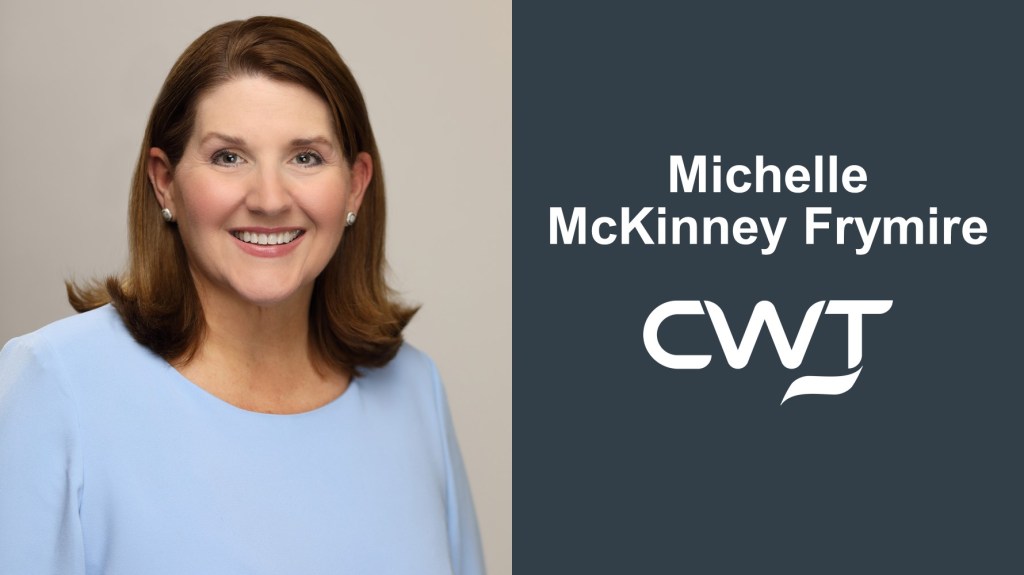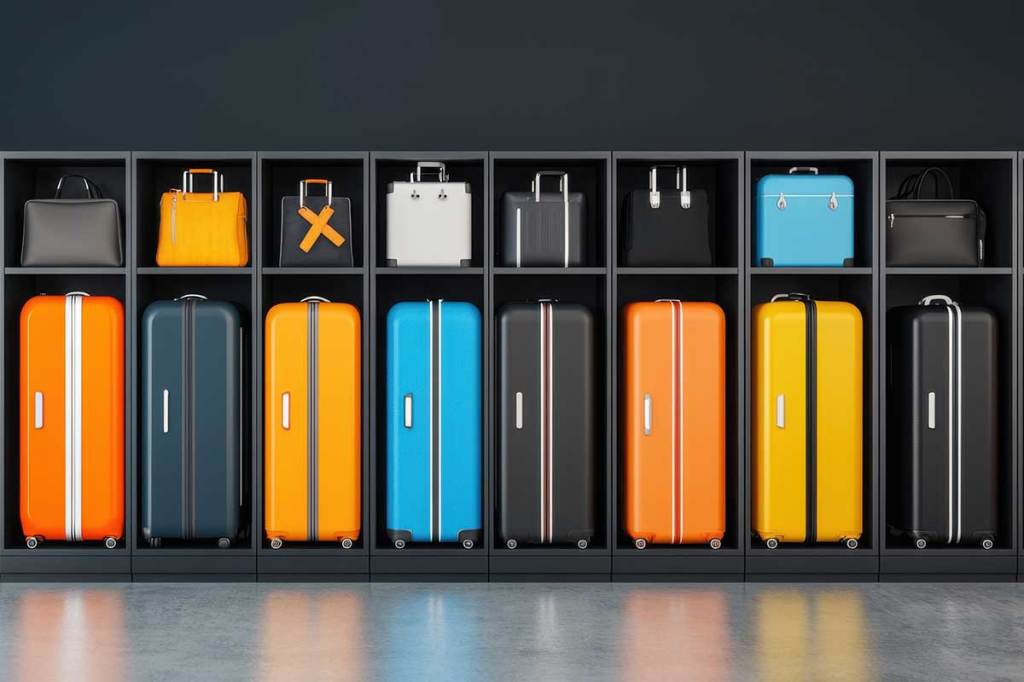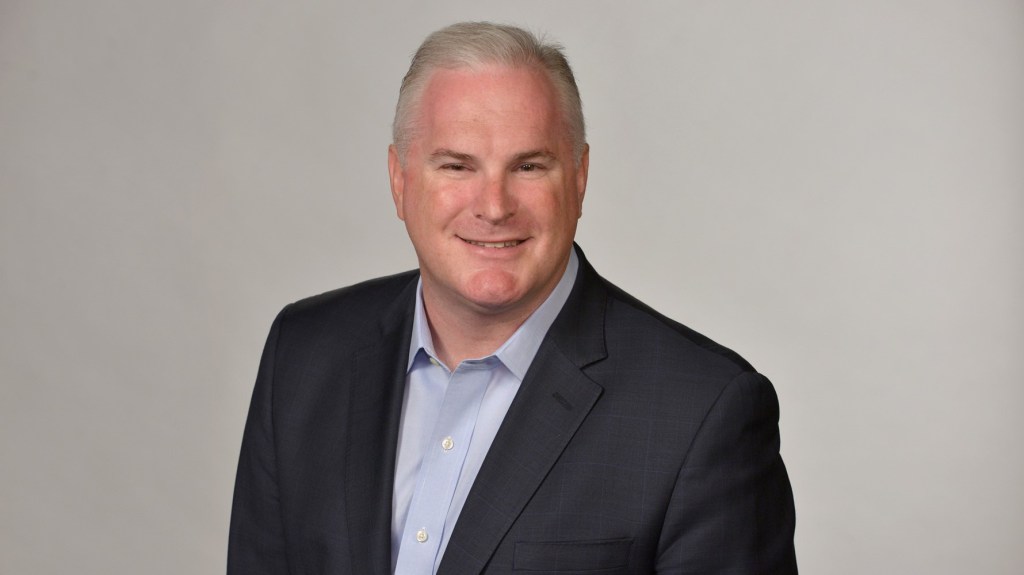Introducing the latest myCWT product and service enhancements
Building on our digital, omnichannel myCWT platform, our new products and services will simplify travel management for you and your employees – anytime, anywhere, anyhow.
Note: Featured services may not be available in your country at this time. Please reach out to your CWT representative for more details.
Hear from Chief Product Officer, Erica Antony as she shares the key product highlights of 2024, along with the key areas driving innovation.
-

2040: Baseline, Boom or Bust
As we enter an era of rapid transformation and unprecedented challenges, it is essential for travel managers, meeting & event planners, and corporate decision-makers to look ahead and frame our current strategic thinking with a clear vision of the future. Business travel and meetings and events (M&E) are poised for significant change over the next decade and a half, driven by a complex interplay of sustainability goals, technological advancements, evolving work models, and geopolitical dynamics.
In this paper to mark the 10th anniversary of our Global Business Travel Forecast, we explore, for the first time, a long-term vision of the future and potential trajectories through three distinct scenarios, each offering insights into how these forces should affect policy-making, budgeting and priorities. By examining these scenarios, we can better understand the diverse possibilities that lie ahead and the strategic imperatives required to thrive in each potential future.
Based on trajectory data analysis and interviews with industry leaders, behaviorists and climate tech founders, this forward-looking approach enables us to anticipate changes, strengthen our strategies, and make informed decisions that align long-term objectives. It is through this lens of foresight and adaptability that we can build resilience, seize opportunities, and navigate the complexities of the future.
We invite you to reflect on the insights presented, and consider how your organization can prepare for the opportunities and challenges that lie ahead. Together we can ensure that travel and meetings remain catalysts for growth, scalability and sustainable practices.
- Scenario development is both an art and a science
- Megatrends Shaping the Future of Business Travel, Meetings and Events
- Sustainability goals the new crux of corporate policy
- Technology Revolutionizes Travel Management
- Modern work models spark new travel patterns
- Changing demographics open doors to new opportunities
- Three Scenarios: Base case, boom and bust
- Future-proofing strategies

-

CWT GBTA Global business travel forecast 2025
When it comes to pricing, global business travel has finally reached an enduring, higher baseline. Prices will continue to rise in 2025, but only moderately, so expect a period of normalized growth.
However, this pricing environment, one of marginal gains and price regularity, is fragile. Global leisure travel has now realized a lot of its pent-up demand, while corporate travel has been resurgent, with 2024 edging at preCovid levels.
There are many factors at play, whether its volatile oil prices, labor costs and constraints, inflationary pressures, and geopolitical factors. As this elevated baseline edges upwards, albeit marginally, travel budgets will come under increased scrutiny, especially as travel patterns and attitudes change.
It’s why business travel can’t be viewed in a silo, and the true value to an organization must be fully realized. This forecast can help with those calculations.

-

Capitalize on emerging technologies in corporate travel
Technological advancements are accelerating at an unprecedented pace. How will emerging innovations like Generative AI, blockchain, and self-sovereign identity (SSI) transform corporate travel?
BTN and CWT probed global CEOs, travel managers, industry consultants and tech experts on the promises, questions, and expectations these innovations raise and how they are set to reshape traveler experience, cost control and service delivery in corporate travel and events.
Download and discover
- The technologies that will have the greatest impact on corporate travel in the next 2-5 years
- How these emerging technologies are poised to control costs, enhance service and security, and boost efficiency
- The critical challenges, opportunities, risks and roadblocks each innovation raises
- What travel managers, buyers and experts anticipate from these innovations

-

Carlson Wagonlit Travel appoints Michelle Frymire as CFO
Carlson Wagonlit Travel (CWT), the global travel management company, has appointed Michelle Frymire as Executive Vice President and Chief Financial Officer (CFO). Based in Minneapolis, Michelle will report to Kurt Ekert, President & CEO of CWT and serve as a member of the CWT Executive Leadership Team. Current CFO Brad Hall will become Executive Vice President, Chief Administrative & Financial Officer of Carlson Inc., CWT’s parent company. Both appointments will be effective from 21 January 2019.
“Michelle brings a wealth of experience and skill from a broad industry base. I am delighted to welcome her to CWT and look forward to partnering with her as we continue to execute our CWT 3.0 growth strategy,” said Kurt Ekert. “I also extend my deep gratitude to Brad for the significant contribution he has made to the development of our business and I look forward to continuing to work with him in his new role.”
Immediately prior to her appointment, Michelle was CFO at a portfolio company of private equity firm Kohlberg & Co. She was previously CFO at Service King Collision Repair, TruGreen Lawn Care and Starwood Vacation Ownership, and held senior finance roles at ServiceMaster, Delta Air Lines, Continental Airlines and American Airlines.
Michelle is an American national and holds an MBA from the University of Texas and a BA from Austin College.
Carlson Wagonlit Travel
Companies and governments rely on us to keep their people connected. We provide their travelers with a consumer-grade travel experience, combining innovative technology with our vast experience. Every day, we look after enough travelers to fill more than 260 Boeing 787s and 100,000 hotel rooms – and handle 105 events. We operate in around 150 countries, and in 2017 posted a total transaction volume of more than US$ 23 billion.
-

5 reasons why booking your air tickets using your smartphone is so ‘wicked’
You have probably heard the news recently that we have expanded our mobile air booking offering in 20 key markets around the world, giving travelers the option of securing their flights directly on the myCWT app.
But, why is this such a game changer? Here’s 5 reasons to embrace this new way of making reservations. If you try it, there will be no going back.
- You will be as fast as lightning. We live in an era where we rush through life. Time is money, hence you will be happy to hear that booking a typical domestic itinerary can take as little as 60 seconds from start to finish. Say goodbye to waiting for an email confirming your next trip or spending 20 minutes on the phone checking schedules. Hopefully, you will cash back those precious minutes to catch your breath and smell the roses or, at least, to do something you enjoy.
- By saving money, you will make your travel manager and your boss happy. As Plato said once, “Caring about the happiness of others, we find our own.”
Early analysis shows that clients with air booking capability have seen a 30% shift from offline to online, saving on fees. Plus, the air booking capability has a set of innovative features, including a ‘best time to book’ indicator, which will alert you when prices are expected to increase, and recommends an optimal time to book. That generates savings and encourages early booking, something we know your travel manager will love you for.
And, a 24-hour search function gives you a complete list of options, including cheaper flights outside a specified window. This simplifies your booking experience for you, while, again, saving costs for your employer. A win-win for all. - You will have a mind-pop saver. Do you ever wake up in the middle of the night in a cold sweat because you just remembered you should have booked your flights well in advance to save money or did the realization maybe happen when you were on the bus back home? Fear no more. Thanks to myCWT the only thing you need to do now is grab your phone and proceed.
- And the perfect excuse to be lazy. If the epiphany happens when you have already closed your computer, don’t worry. You do not need to turn it on again or get your laptop out of its case. You can just easily do the reservation over the mobile app.
- You will shine at every party. Help your friends to organize their next escape by checking the best alternative flights to their dreamed destination. CWT’s mobile air booking supports global distribution system (GDS) and low-cost carrier content so you can be sure to offer them the best alternatives.
- You will be as fast as lightning. We live in an era where we rush through life. Time is money, hence you will be happy to hear that booking a typical domestic itinerary can take as little as 60 seconds from start to finish. Say goodbye to waiting for an email confirming your next trip or spending 20 minutes on the phone checking schedules. Hopefully, you will cash back those precious minutes to catch your breath and smell the roses or, at least, to do something you enjoy.
-

Airline baggage fees
Major airline baggage fee links
All airline baggage fee links
-

Room with a (long-term) view: When to book extended-stay
Extended-stay properties are sprouting up with increased regularity. It feels as if sharing economy and apartment properties receive daily attention, and traveler demand appears to be keeping pace. Travel buyers have certainly taken notice too, as 94% believe they will have to allow more flexibility, or maintain current levels of flexibility for extended-stays and for alternative lodgings.
Only about 10% of business travel bookings are for stays longer than 5 days, a trend that has remained relatively stagnant for years. So why the growing interest?
Here are 5 reasons extended-stays and apartments may be worth considering regardless of a traveler’s length of stay.
- Increased availability
For one thing, extended-stay and apartment content can improve availability. If a traveler is booking accommodations in a city experiencing sell-out conditions, the allowance of additional lodging types can only increase the chance to stay within budget. This is also true for travelers going to markets with fewer hotel options.
Since location remains the highest determinate of why business travelers book particular accommodations, interest in non-traditional accommodation types in major markets is growing as well.
For example, Chicago has a high concentration of traditional hotels in its downtown areas, yet major companies, such as McDonalds and Google, have opened offices in newer, trendy neighborhoods. If a traveler wants to stay nearby and the limited traditional hotel inventory is sold out, some travelers would rather book alternative accommodations in these neighborhoods than suffer a longer commute to the meeting from a hotel farther afield. - Reduced average daily rate
If you have a goal of reducing travel costs, the average daily rate (ADR) of extended-stays may be worth investigating. In 2017, lower-tier extended-stay properties had a $69 ADR in the US. Compare this with the overall US ADR in 2017 of $126.72. Interestingly many of these properties don’t have a minimum night stay. - Improved traveler satisfaction
89% of travelers surveyed by extended Stay America said they would rather cook in a hotel kitchen as opposed to eating out if given the chance. For some, eating in provides more ease and comfort when away from friends and family.
92% of travelers in the same survey felt home cooked meals are healthier than eating out. This should come as no surprise. What it means for travel managers, however, is if they have a goal of improving traveler satisfaction, providing healthy travel options is pivotal. Therefore, allowing and promoting the benefits of extended-stay accommodations can go a long way in making travelers happy. - Reduced out-of-pocket costs
Staying within per diem limits and understanding what can be expensed brings anxiety to many business travelers. Companies often set blanket per diems that may not appropriately account for disparate cost of living among cities, which means travelers may end up paying for some of their meals out of pocket. Simply having access to a full kitchen gives travelers more opportunity to stay within spending limits. - Less out-of-program bookings
Empowering travelers with a variety of choice is vital in the pursuit of greater hotel program compliance. Travel programs that restrict alternative lodgings or extended-stay bookings are often working against travelers who willingly go outside corporate channels in search of these properties. Why do travelers do this?
Whether a traveler is on a contract, training or even relocating, it may be difficult for them to find a property that is available for the entirety of their lengthy stay. When booking, travelers need to hope that one night out of their entire stay at a traditional hotel isn’t sold-out, otherwise that hotel will be completely unavailable. This can push travelers outside your booking tools in search of accommodations that tend to take bookings for extended periods of time. If your policy is more restrictive, it may be time to readdress this topic considering the fact that 60% of travelers are untracked when they book direct.
Greater flexibility in extended-stay accommodations seem to be on the horizon. Major hotel brands are entering the alternative lodging space and increasing their extended stay brand footprints. It’s important to familiarize yourself with their benefits and equip your travelers with the right tools for finding and booking these properties.
- Increased availability
-

CWT Solutions Group adds Predictive Analytics capabilities, revealing new savings opportunities
Carlson Wagonlit Travel, the global travel management company, has introduced Predictive Analytics capabilities, significantly improving the accuracy of forecasts, providing much better visibility over key travel metrics, and giving clients new opportunities to control travel spend.
CWT Solutions Group, CWT’s consulting division, has built an advanced data model that sifts through large historic travel data sets, as well as public data on commodity prices, macro-economic indicators, weather, and holidays. Those data are analyzed to identify patterns and correlations, generating robust predictions for a company’s future spend, specifically number of trips and cost per trip.
“With these new cutting-edge algorithms, we can predict a company’s spend with remarkable accuracy,” said Christophe Renard, Vice President of CWT Solutions Group. “Predictive Analytics is very helpful in giving our clients actionable insights – even small changes to travel policies or supplier programs can lead to big savings. As one of the world’s largest business travel companies, we are sitting on a treasure trove of data. Using Predictive Data, we can really make that data work for our clients.”
A successful trial of Predictive Analytics with one of CWT Solutions Group’s largest global clients delivered a sharp improvement in accuracy compared to previous approaches. Using this new capability, the client was able to identify areas with potential savings of up to 10%. The trial also demonstrated that results get better over time as the system learns from ever-larger data sets.
The technology will be rolled out to CWT Solutions Group clients globally over the course of 2019.
Please download a copy of the CWT Solutions Group Whitepaper on Predictive Data.
Carlson Wagonlit Travel
Companies and governments rely on us to keep their people connected. We provide their travelers with a consumer-grade travel experience, combining innovative technology with our vast experience. Every day, we look after enough travelers to fill more than 260 Boeing 787s and 100,000 hotel rooms – and handle 105 events. We operate in around 150 countries, and in 2017 posted a total transaction volume of more than US$ 23 billion.
-

Give me Wi-Fi! – Is the promise of free internet on board a blessing or a curse?
With Delta Air Lines’ CEO, Ed Bastian, announcing recently that the company is working towards offering free Wi-Fi on all its flights, and with several airlines already offering the service – including low-cost carrier, Norwegian – one can only wonder if internet access is going to become the latest must-have when choosing an airline.
High-speed train operators used to highlight the lack of onboard aircraft connectivity as a core benefit offered by rail companies – You’re always plugged-in into your 4G network, with no excuse for not checking your emails and getting work done while traveling.
Technological developments are giving airlines a better connection to the net and companies are using free access as a differentiator.
So, is free internet access becoming a human right? Considering the time people spend surfing the net, you might think so.
According to the latest GlobalWebIndex data, the average internet user spends around six hours each day using internet-powered devices and services, and I find it difficult to foresee this figure being likely to decrease in the coming years.
So, with that in mind, the race for having access to the internet seems unstoppable, which means we will need to face our own Jiminy Cricket if we decide to sleep on board, or watch the latest movies, instead of doing some online work.
The days of out-of-office messages saying we will not have email access while traveling long-haul might well be numbered. Soon, it might even be possible to attend a conference call while flying.
I can picture half of the cabin with headphones on trying to make themselves understood over the general chitchat, the pilot’s announcements and the engine’s noise. And, if I am honest, for me this image is terrifying.
Will we then assist in the creation of a new class: the quiet one where speaking will be forbidden? Maybe there is a premium pricing proposition in any class for silence?
Interesting times ahead of us, no doubt – but let’s not talk about it now as I have just landed and I’m catching up on my emails.
-

CWT expands mobile air bookings; travelers in twenty countries can now book flights directly on myCWT app
Carlson Wagonlit Travel, the global travel management company, has expanded its mobile air booking offering in 20 key markets around the world, giving travelers the option of booking their flights directly on the myCWT app.
“Travelers can now do everything they need to do right on their smartphone,” said said Amir Kirshenboim, CWT’s Chief Technology Officer, Digital. “The process is simple, fast and easy, and clients have full control over what their travelers can book – so travelers save time, and companies save money.”
The service was originally piloted in early 2017, and launched commercially in Q2 2018. Mobile air booking is now being rolled out to some of the largest markets around the world, including the US, Germany, France, the UK, Canada, Switzerland, Austria, Italy, Australia, Poland, Brazil, Denmark, Hong Kong, Singapore, Spain, Ireland, Belgium, and the Netherlands.
A typical domestic booking can take as little as 60 seconds from start to finish. Early analysis shows that clients with air booking capability have seen a 30% shift from offline to online, saving on fees. CWT’s mobile air booking supports global distribution system (GDS) and low-cost carrier content, as well as client rates and preferred airlines.
The air booking capability has a set of innovative features, including a “best time to book” indicator, which alerts travelers when prices are expected to increase, and recommends an optimal time to book. That generates savings and encourages early booking.
A 24-hour search function gives travelers a complete list of options, including cheaper flights outside a specified window. This simplifies the booking experience for travelers, while again saving costs for their employers.
CWT’s award-winning myCWTapp already features check-in functionality for most major airlines, as well as notifications for flight delays, cancellations, gate changes, and safety and security travel alerts. It also offers mobile hotel bookings for 850,000 hotels worldwide, calendar synching, traveler profile integration with loyalty programs, and advanced sharing functionality. Since launching in 2013, more than 1.2 million travelers have signed up for myCWT.
Carlson Wagonlit Travel
Companies and governments rely on us to keep their people connected. We provide their travelers with a consumer-grade travel experience, combining innovative technology with our vast experience. Every day, we look after enough travelers to fill more than 260 Boeing 787s and 100,000 hotel rooms – and handle 105 events. We operate in around 150 countries, and in 2017 posted a total transaction volume of more than US$ 23 billion.
-

It’s electrifying – Will we assist to the end of fossil fuels propelled aircraft any soon?
After decades of being powered by fossil fuels, technological advances are making the entelechy of electric commercial aviation a reality.
According to the global consultancy Roland Berger, “the number of electrically propelled aircraft around the world now exceeds 130.” This advance alone sounds promising, but the good news is that the global consultancy firm expects that the first hybrid-electric aircraft of under 50 seats will enter into fare-paying passenger service by 2032.
Big players, already investing heavily in the technology, are even more optimistic. Airbus, for instance, is aiming to start flight testing by the end of 2020 and, one year after that, it hopes its E-Fan X aircraft can make its first public flights.
As with electric cars, which are gaining momentum – especially in big metropolitan areas, one of the big benefits of it will be the reduction of carbon emissions.
Aviation is one of the fastest-growing sources of greenhouse gas emissions accounting for more than 2% globally. By 2020, global international aviation emissions are projected to be around 70% higher than in 2005 and the International Civil Aviation Organization (ICAO) forecasts that, by 2050, this could grow by a further 300-700%. In fact, according to Roland Berger, “left unchecked, aviation’s share of greenhouse gas emissions could reach 24% by 2050.”
Electrical propulsion can be the answer to this horrific scenario, and also to another problem associated with air traffic: the noise endured by people living near runaways.
Will we assist a change in the planning of our cities? It is very likely so.
And not only that. According to Airbus, “hybrid, or fully electric propulsion, also has the potential to open up new possibilities for aircraft design. Future vertical take-off and landing aircraft, including for Urban Air Mobility applications, will benefit due to the higher reliability and lower maintenance costs.”
It seems we are entering another interesting time for the aviation industry, which will join the ranks of decarbonization of other forms of transportation like cars and trains.
The real question is passenger willingness – would you like to try it and emulate French stunt pilot Hughes Duval, who crossed the English Channel in an electric aircraft in the summer of 2015?
-

The rise of ancillary revenue – Is the lowest available fare always the best option?
Ancillary revenue in the airline industry – generated by activities and services that yield revenue for airlines beyond the simple transportation of passengers from A to B – has increased dramatically over the years.
If you read our 2019 Energy, Resources & Marine Travel Forecast, you probably spotted a graph based on Idea Works Company data that shows a steady growth of it; from 32.5 billion US dollars in 2011 to 82.2 billion in 2017.
Impressive, isn’t it? So, what’s behind this phenomenal increase?
The economic downturn of 2008 made companies more cost-conscious. Travel policies were tightened up with a stronger focus on compliance.
Companies said farewell to the business class of the golden age of travel and started to book lowest available fares. Even low-cost companies became the new normal for business travelers around the world – C-Suite executives included.
And interestingly enough, as companies tightened their belts, airlines started to implement new creative ways of getting back some of this lost revenue. How? By taking inspiration from their low-cost competitors’ business model. Ancillary charges were born.
Despite the fact that the economy is slowly picking up, the crisis has left a mark. Austerity and caution are very much alive when it comes to travel program design and there are many travel managers that are still focusing their policies on the lowest available fares.
But are they always the best option when it comes to savings?
The answer is no. Not all that glitters is gold. These fares have many restrictions and any changes or extra services will end up costing your company more down the line than if you had booked a more flexible, if slightly higher, fare in the first place.
So, if you do not want to end up paying more for your travel, data reporting and regular analysis are your best friends. If you can put a number on your change rate, and either work to reduce it or use it to decide on the most appropriate fare, you will save money in the long run.
If you work in the energy, resources and marine sectors, the chances are that you have a high rate of last-minute changes and cancellations, so check your data carefully and adjust your policy accordingly.
And do not forget to always consider the traveler. Combine budgetary prudence, employee engagement, and your duty of care when establishing policies. Let your travelers lead policy change where necessary. I can assure you it will pay off in the long run.
More about CWT Energy, Resources & Marine.
-

CWT’s Kurt Ekert named Vice Chair of United States Travel and Tourism Advisory Board
Kurt Ekert, President and CEO of CWT, the global travel management company, has been appointed Vice Chair of the United States Travel and Tourism Advisory Board by Secretary of Commerce Wilbur Ross.
Established in 2003, the Board advises the Secretary of Commerce on key matters affecting U.S. travel and tourism, and provides a forum for industry-related discussions.
“I am honored to be part of this team of experts who play such an important role in shaping the travel industry,” said Kurt Ekert. “We will focus our efforts on attracting new visitors to America, solving issues, and continuing to boost the US economy.”
The Board is comprised of up to thirty-two members representing companies and organizations in the travel and tourism industry, spanning a broad range of products, services, sizes and locations. Past Boards have provided counsel on issues including travel facilitation, visa policy, infrastructure, aviation security, research, energy policy and economic sustainability. CWT’s Director of Corporate Affairs, Natalie Volin Lehr, will serve as Ekert’s deputy.
Ekert has more than twenty years of experience in travel, tourism and technology. He was appointed President and CEO of Carlson Wagonlit Travel in April 2016, previously holding leadership and governance positions at Cendant, Continental Airlines, eNett, GTA, Orbitz Worldwide and Travelport. Ekert is currently a director of Passur Aerospace and the World Travel & Tourism Council, an advisor to Freebird Inc., and serves on the board of the UNGA Global Partnership to End Violence Against Children.
Carlson Wagonlit Travel
Companies and governments rely on us to keep their people connected. We provide their travelers with a consumer-grade travel experience, combining innovative technology with our vast experience. Every day, we look after enough travelers to fill more than 260 Boeing 787s and 100,000 hotel rooms – and handle 105 events. We operate in around 150 countries, and in 2017 posted a total transaction volume of more than US$ 23 billion.
-

Six steps to working effectively with startups (if you’re a TMC)
In the second of our Open Innovation series, CWT’s Brandon Balcom, senior director of Open Innovation, shares his top tips on successfully working with startups. While a travel management company (TMC) and a startup may seem an unlikely cultural fit, Brandon focuses on what each brings to the table, while sidestepping stereotypical traps. As CWT’s top scout for promising entrepreneurs, Brandon knows a thing or two about what makes for a symbiotic relationship between seemingly improbable partners that ultimately, benefits the customers.
Step 1: Know thyself
The ancient Greek aphorism continues to find relevance, including for today’s TMCs in various stages of transforming into fully digital enterprises—and looking to startups for that innovative shot in the arm. Before partnering with any budding entrepreneur, ask yourself: what is your current strategy, and where are you going with it? Then the questions become: how fast can you get there and how do you leverage the innovation of startups to get there faster?
Step 2: Go the revenue-sharing route
At CWT, we’re more focused on finding startups we can partner with to rapidly deploy the kind of products and services that fit our current strategy. We don’t operate as a venture capital fund that places a massive bet on a startup upfront and takes an equivalent stake in its future earnings whenever they may come.
Instead, we offer up our sales channel and a sales force already trained in the complex business travel terrain. Our large customer base allows us to deploy any products or services right away and immediately share revenues with our partners. For our part, our cost basis will be that revenue.
Step 3: Move fast and slow
In his best-selling book, Thinking, Fast and Slow, Nobel Prize laureate Daniel Kahneman distinguishes between thinking fast, instinctive and emotional, and thinking slower, more deliberative and more logical. In TMC and startup parlance, we translate that to moving both fast and slow.
As TMCs, we operate in a complex, often bureaucratic environment that includes satisfying customers’ sensitive data privacy and security requirements, which preclude us from moving as fast as startups would like.
By breaking up projects into component parts and strategically focusing on areas that we need to speed up, while doing due diligence in others, we are able to move the needle quickly, bit by bit, while keeping an eye out for evolving trends and threats, ready to adjust course as needed.
Step 4: A trade-off that pays off
While the total process may take longer than a startup DIY-ing it all, the time to get to market and gain the expertise to different business traveler profiles will eat up all the time they’ve saved—and more. Spending all their resources developing for one signed client that they may not be able to scale across different accounts is another potential time-waster.
By partnering with a TMC like CWT, startups gain instant access to a $26 billion business travel market—and a map to boot.
Step 5: Bring customers in for a test drive
We believe in bringing customers early into the process. That initial feedback is invaluable. Finding out at the end that you didn’t have the right indicators or necessary requirements to make it work for your client means that you’ll likely end up with a product with a low adoption rate and negligible revenue stream.
It does carry risks of overinflating expectations, so we recommend modeling against the hype cycle to avoid the so-called ‘trough of disillusionment’. While we transparently show them everything and share all the concepts, we are also upfront that not all of it will come to life. Which is why their input is critical so that what does come to fruition is something that they can use and we can scale.
Step 6: Protect your reputation
Evaluating upwards of 300 startups annually and keeping tabs of what might work for our current strategy and what may be promising in the future are just two of the balls we’re juggling. Just as we are upfront with clients, so are we with the startups we’re assessing. We respect the energy and ideas they bring to the table and their need to find the right partners and resources to bring their vision forward.
We are careful not to overhype potential opportunities. Even if we’re excited by an idea, if we are not in a position to move on it right away, we inform them as soon as possible and never string them along. The business travel and Silicon Valley communities are both tight-knit, and we know that a solid reputation can go a long way in closing a deal—when you need to.Stay tuned for our next post in this series as we show you the CWT-startup partnership in action.
-

New research identifies disconnects in travel program goals, policy and traveler behavior
Nearly 70 percent of travel buyers say that enforcing policy compliance is among the most challenging aspects of their job, according to new research out today from the Global Business Travel Association (GBTA) in partnership with RoomIt by CWT. While travelers may book out-of-policy for preferred properties or amenities, there is also a large gap in traveler knowledge of company policy.

“Travel program goals can be difficult to reach when travel buyers and business travelers are not on the same page,” said Jessica Collison, GBTA director of research. “The research identifies where disconnects exist between hotel policy and traveler behavior and provides buyers with areas they can focus on to drive increased cost-savings without necessarily compromising on traveler satisfaction. Ongoing communication to keep travelers informed on policy can go a long way toward achieving program goals.”
“Business travelers want to find the right room in the right place with the right amenities – and stay within the rules set by their hotel program,” said David Falter, President of RoomIt by CWT. “At the end of the day both the travel manager and traveler ultimately have similar goals to save money. Travel buyers can do so by offering travelers more choice and increasing compliance.”
Property Levels & Amenities
Reducing program costs, increasing policy compliance and traveler satisfaction top the list of goals travel buyers have for their travel programs in 2019. Travel buyers typically negotiate with a variety of suppliers to provide their travelers with the best possible rates. While the vast majority (78 percent) of business travelers say they are satisfied with their rate allowances for booking hotels, two-thirds (66 percent) also say they would like a higher rate allowance to stay at preferred properties that may better meet their needs.
In fact, U.S. business travelers are more likely book luxury properties, potentially out of policy, according to the research. Only 7 percent of European buyers say they allow luxury properties in their hotel programs compared to 16 percent in the United States, yet on average only 8 percent of UK travelers and 7 percent of French travelers book luxury properties versus 30 percent of U.S.-based travelers. The trend of U.S. travelers booking luxury out of policy may be related to higher dissatisfaction with rate allowance.
Travelers want to use amenities that are not always included in their travel policy, leaving room for increased satisfaction. Over three-quarters of business travelers would prefer to book bundled rates including multiple amenities, even if the rate is slightly higher, however, very few (11 percent) travel programs always allow booking bundled rates. Travelers often book bundled rates with the belief that doing so ultimately contributes to cost-savings goals, although that may not necessarily be the case.
When travelers were asked which amenities they would purchase on business travel if they had no limits within their company policy, they cited several, including premium WiFi, gym passes and food delivery services.

Loyalty’s Role in Booking & Satisfaction
The inability to earn loyalty points could drive traveler dissatisfaction. Nearly three-quarters (71 percent) of travelers believe that if they give up their time to travel, they should have the ability to earn loyalty points and over half (51 percent) would risk being reprimanded for booking out-of-policy if it meant they could book a hotel where they could earn loyalty points.
Loyalty plays a significantly bigger role in the United States as 25 percent of U.S. business travelers say the ability to earn loyalty points is a factor in choosing where to book, and over half (52 percent) say they would never consider booking a hotel where they could not earn loyalty points. This compares to 37 percent in France and 31 percent in the UK.
Methodology
An online survey of 265 travel buyers in the United States (131) and Europe (134) was fielded between September 19 and October 12, 2018. European countries surveyed included United Kingdom, Germany, Denmark, Norway, Sweden, France, The Netherlands and Finland. Additionally, a survey was conducted of 750 business travelers in the United States (247), United Kingdom (254), and France (249) using an online panel. This survey was fielded between October 5 and October 15, 2018 with respondents qualifying if they (1) were employed full-time or part-time, and (2) traveled for business more than once in the past year.
RoomIt by CWT
RoomIt by CWT is the hotel distribution division of Carlson Wagonlit Travel, a long-standing leader in business travel. Every day we match travelers with the right room at the right rate, and every minute we book over 30 hotel rooms. We also provide travelers with the amenities and loyalty programs they want; while helping organizations control their budget and improve travel oversight.
Carlson Wagonlit Travel
Companies and governments rely on us to keep their people connected. We provide their travelers with a consumer-grade travel experience, combining innovative technology with our vast experience. Every day, we look after enough travelers to fill more than 260 Boeing 787s and 100,000 hotel rooms – and handle 105 events. We operate in around 150 countries, and in 2017 posted a total transaction volume of more than US$ 23 billion.
The Global Business Travel Association
The Global Business Travel Association (GBTA) is the world’s premier business travel and meetings trade organization headquartered in the Washington, D.C. area with operations on six continents. GBTA’s 9,000-plus members manage more than $345 billion of global business travel and meetings expenditures annually. GBTA delivers world-class education, events, research, advocacy and media to a growing global network of more than 28,000 travel professionals and 125,000 active contacts. To learn how business travel drives lasting business growth, visit gbta.org.